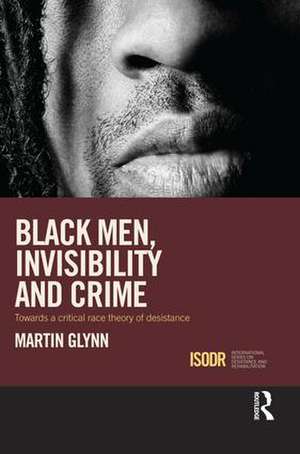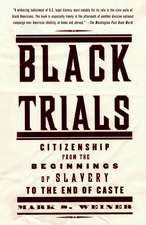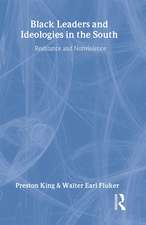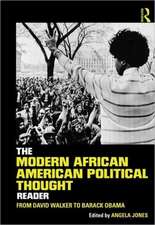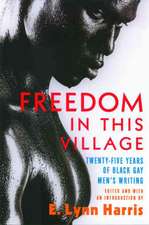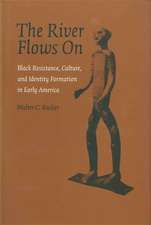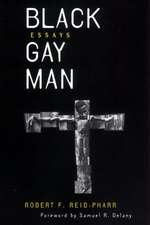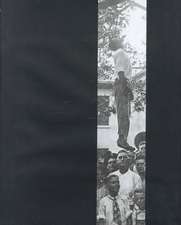Black Men, Invisibility and Crime: Towards a Critical Race Theory of Desistance: International Series on Desistance and Rehabilitation
Autor Martin Glynnen Limba Engleză Paperback – 26 aug 2015
Martin Glynn builds on recent empirical research in the UK and the USA and uses Critical Race Theory as a framework for developing a fresh perspective about black men’s desistance. This book posits that the voices and collective narrative of black men offers a unique opportunity to refine current understandings of desistance. It also demonstrates how new insights can be gained by studying the ways in which elements of the desistance trajectory are racialised.
This book will be of interest both to criminologists and sociologists engaged with race, racialisation, ethnicity, and criminal justice.
| Toate formatele și edițiile | Preț | Express |
|---|---|---|
| Paperback (1) | 349.71 lei 6-8 săpt. | |
| Taylor & Francis – 26 aug 2015 | 349.71 lei 6-8 săpt. | |
| Hardback (1) | 1055.66 lei 6-8 săpt. | |
| Taylor & Francis – 2 dec 2013 | 1055.66 lei 6-8 săpt. |
Din seria International Series on Desistance and Rehabilitation
- 9%
 Preț: 1005.12 lei
Preț: 1005.12 lei -
 Preț: 310.51 lei
Preț: 310.51 lei - 9%
 Preț: 1005.04 lei
Preț: 1005.04 lei -
 Preț: 434.83 lei
Preț: 434.83 lei -
 Preț: 406.97 lei
Preț: 406.97 lei -
 Preț: 385.25 lei
Preț: 385.25 lei - 9%
 Preț: 903.99 lei
Preț: 903.99 lei -
 Preț: 385.62 lei
Preț: 385.62 lei -
 Preț: 449.41 lei
Preț: 449.41 lei - 17%
 Preț: 257.76 lei
Preț: 257.76 lei -
 Preț: 416.22 lei
Preț: 416.22 lei -
 Preț: 392.50 lei
Preț: 392.50 lei -
 Preț: 484.69 lei
Preț: 484.69 lei -
 Preț: 389.38 lei
Preț: 389.38 lei -
 Preț: 411.64 lei
Preț: 411.64 lei -
 Preț: 233.25 lei
Preț: 233.25 lei - 5%
 Preț: 1160.70 lei
Preț: 1160.70 lei -
 Preț: 464.76 lei
Preț: 464.76 lei -
 Preț: 341.85 lei
Preț: 341.85 lei -
 Preț: 389.66 lei
Preț: 389.66 lei - 18%
 Preț: 1000.27 lei
Preț: 1000.27 lei - 18%
 Preț: 1000.87 lei
Preț: 1000.87 lei - 17%
 Preț: 258.70 lei
Preț: 258.70 lei - 5%
 Preț: 1047.45 lei
Preț: 1047.45 lei - 18%
 Preț: 1000.58 lei
Preț: 1000.58 lei - 18%
 Preț: 946.93 lei
Preț: 946.93 lei - 9%
 Preț: 934.94 lei
Preț: 934.94 lei - 18%
 Preț: 1064.01 lei
Preț: 1064.01 lei -
 Preț: 388.13 lei
Preț: 388.13 lei -
 Preț: 430.80 lei
Preț: 430.80 lei - 18%
 Preț: 1004.55 lei
Preț: 1004.55 lei
Preț: 349.71 lei
Nou
Puncte Express: 525
Preț estimativ în valută:
66.92€ • 70.05$ • 55.37£
66.92€ • 70.05$ • 55.37£
Carte tipărită la comandă
Livrare economică 05-19 aprilie
Preluare comenzi: 021 569.72.76
Specificații
ISBN-13: 9781138933675
ISBN-10: 1138933678
Pagini: 200
Ilustrații: 2
Dimensiuni: 156 x 234 x 13 mm
Greutate: 0.29 kg
Ediția:1
Editura: Taylor & Francis
Colecția Routledge
Seria International Series on Desistance and Rehabilitation
Locul publicării:Oxford, United Kingdom
ISBN-10: 1138933678
Pagini: 200
Ilustrații: 2
Dimensiuni: 156 x 234 x 13 mm
Greutate: 0.29 kg
Ediția:1
Editura: Taylor & Francis
Colecția Routledge
Seria International Series on Desistance and Rehabilitation
Locul publicării:Oxford, United Kingdom
Public țintă
Postgraduate and UndergraduateCuprins
1. Introduction, 2. Racialisation and criminalisation, 3. Approaching black men's desistance, 4. Developing a black criminology of desistance, 5. Black men and the barriers towards desistance, 6. Black men, therapeutic interventions and desistance, 7. African American men and their desistance, 8. A theoretical framework of masculinities in relation to black men's desistance, 9. A critical race theory of desistance, 10. New directions for black male desistance.
Notă biografică
Martin Glynn is Research Assistant at the University of Wolverhampton and completed his PhD at Birmingham City University, where he is also a visiting lecturer. His research interests include desistance, race/racialisation and crime, critical race theory, ethnodrama, masculinities and crime, and crime and social determinants of health.
Recenzii
‘Race is the elephant in the room in all of criminology, and few of us are brave enough to acknowledge it. Martin Glynn’s remarkable new book isn’t just brave, it is fearless. The elephant is finally within our grasp.’
Shadd Maruna, Director of Institute of Criminology & Criminal Justice, Queen’s University Belfast, Northern Ireland, UK.
‘Martin Glynn’s challenging new book is an important and novel contribution to debates about desistance – but it is also more than that. Rather than focusing on how ethnicity affects desistance, he draws on critical race theory – and on the accounts of "Black British" and "African American" men he interviewed -- to examine how racism and racialisation influenced the men’s life chances and pathways through crime and justice. In seeking to develop a "black criminology of desistance", Martin Glynn’s analysis enjoins and compels us also to engage with the racialised politics of crime and justice – and of criminology itself.’
Fergus McNeill, Professor of Criminology & Social Work, University of Glasgow, Scotland, UK.
‘In the book Black Men, Invisibility and Crime, Martin Glynn has produced an innovative and crucially important monograph that provides keen insights into desistance among Black men.
Drawing on Critical Race Theory, Martin skilfully explores the contours of desistance specific to the condition and experience of Black men. His fresh comparative perspective provides readers with an examination of the analogous and divergent desistance concerns among Black men in Briton and America. Martin is clearly an important scholar on the rise whose thoughts on re-entry and desistance in the Black community need to be heard by the discipline and the larger criminal justice community in the UK and the USA.’
Shaun Gabbidon, Professor of Criminal Justice, Penn State Harrisburg, USA.
"This book provides a much needed and surprisingly overdue in depth analysis of black men’s views of their own desistance. The author is extremely credible and gathers insights that numerous criminologists would be unable to gather through ethnography or any other means. It is clearly aimed at promoting further research and provides a compelling argument for other criminologists to take forward."
Paul Crossey, Head of Admissions and Care (Young People) at HMYOI Feltham
The Prison Journal, May 2015
Shadd Maruna, Director of Institute of Criminology & Criminal Justice, Queen’s University Belfast, Northern Ireland, UK.
‘Martin Glynn’s challenging new book is an important and novel contribution to debates about desistance – but it is also more than that. Rather than focusing on how ethnicity affects desistance, he draws on critical race theory – and on the accounts of "Black British" and "African American" men he interviewed -- to examine how racism and racialisation influenced the men’s life chances and pathways through crime and justice. In seeking to develop a "black criminology of desistance", Martin Glynn’s analysis enjoins and compels us also to engage with the racialised politics of crime and justice – and of criminology itself.’
Fergus McNeill, Professor of Criminology & Social Work, University of Glasgow, Scotland, UK.
‘In the book Black Men, Invisibility and Crime, Martin Glynn has produced an innovative and crucially important monograph that provides keen insights into desistance among Black men.
Drawing on Critical Race Theory, Martin skilfully explores the contours of desistance specific to the condition and experience of Black men. His fresh comparative perspective provides readers with an examination of the analogous and divergent desistance concerns among Black men in Briton and America. Martin is clearly an important scholar on the rise whose thoughts on re-entry and desistance in the Black community need to be heard by the discipline and the larger criminal justice community in the UK and the USA.’
Shaun Gabbidon, Professor of Criminal Justice, Penn State Harrisburg, USA.
"This book provides a much needed and surprisingly overdue in depth analysis of black men’s views of their own desistance. The author is extremely credible and gathers insights that numerous criminologists would be unable to gather through ethnography or any other means. It is clearly aimed at promoting further research and provides a compelling argument for other criminologists to take forward."
Paul Crossey, Head of Admissions and Care (Young People) at HMYOI Feltham
The Prison Journal, May 2015
Descriere
Martin Glynn builds on recent empirical research in the UK and the USA and uses Critical Race Theory as a framework for developing a new theory of desistance. This book posits that the voices of black men offer a unique opportunity to refine the understandings of desistance and demonstrates how a more thoroughgoing appreciation of desistance can be gained by studying the ways that this process is racialised.
